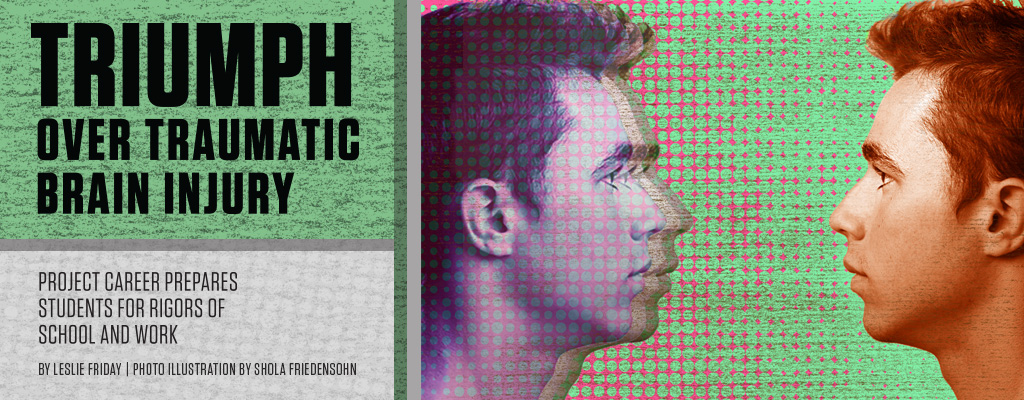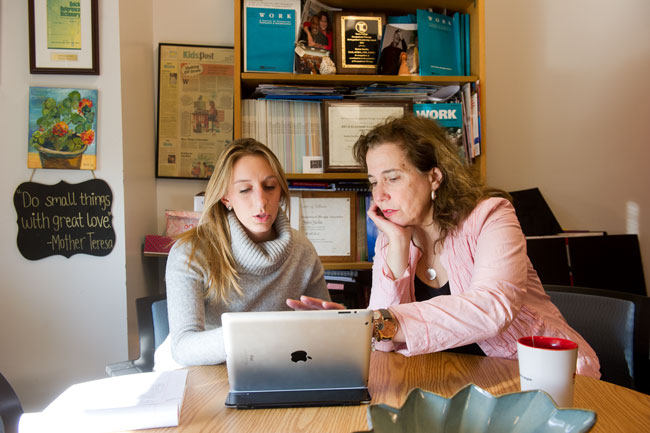Triumph Over Traumatic Brain Injury

Anna Saucier’s life changed in an instant during her sophomore year of high school. She remembers zipping across a soccer field to head off a boy on the opposing team who was fast-breaking toward the goal. The center defender of her coed team, Saucier executed a perfect slide tackle (the first in her career) to prevent the point, but her opponent flipped and landed knee-first on her temple.
She continued to play the minute left in the game before collapsing off the field, suffering from the worst of several concussions she’d had during her career as a four-sport athlete. Saucier (CAS’18) was rushed to the hospital and in the days following, she couldn’t walk, had no energy, and experienced memory issues. She was placed on morphine for three days to control her throbbing headaches.
Plagued by fatigue, an inability to concentrate, and persistent headaches, Saucier was unable to return to school full time for several months. It was enough to drive the straight-A student and class president crazy. “I got really good at coloring,” she says. The walls of her house quickly filled with artwork—a daily reminder of her slow but steady progress.
“There is a real void in services for students with TBI….Every one of these students could benefit from the intense mentoring and advising Project CAREER offers.”
—Karen Jacobs
Instead of giving up, Saucier says she got mad: “I forced myself to get better.” She underwent neurological rehabilitation, got a tutor, and enrolled in honors and AP courses her junior year. “People get injuries and they think that’s it,” she says. “That was never an option for me. I know what I’m capable of, and that’s what I had to get back to.” She graduated among the top students in her class, applied to BU, and started her freshman year in fall 2014. While her condition has improved, she still suffers from crippling headaches and has trouble with organization, time management, and memory.
Just after she arrived on campus, Saucier visited Disability Services. Staff there recommended she enroll in Project CAREER, a program that uses assistive technology and vocational rehabilitation to improve the academic and employment success of college undergraduates with traumatic brain injury (TBI). She is now among 40 part- and full-time students enrolled in the program, which is a partnership among Kent State University, West Virginia University, and JBS International, Inc. The program is being funded by a five-year, $2.5 million grant from the National Institute on Disability, Independent Living, and Rehabilitation Research (NIDILRR) (formerly NIDRR).
“There is a real void in services for students with TBI in helping them transition from being in a student role, graduating from school, and then obtaining a job,” says Karen Jacobs, a clinical professor of occupational therapy and principal investigator for the BU subcontract. “There are limited resources helping them with that transition period. Every one of these students could benefit from the intense mentoring and advising Project CAREER offers.”

Every year roughly 1.7 million Americans sustain a TBI, often from a car or sports accident or a violent assault. This group also includes soldiers who have been injured by explosive devices. Symptoms vary, but people living with TBI often experience trouble with memory, concentration, and organization; may be irritable, tired, or depressed; and may endure punishing headaches. They may find it hard to navigate and understand complex systems and initiate new tasks. And they often fail to connect with support services effectively, or have difficulty establishing and maintaining relationships. Ongoing cognitive impairments have historically made it more difficult for people suffering from TBIs to find—and keep—a job.
Students develop a number of strategies to manage their TBI. They may listen to audiobooks if reading is challenging, request note-takers or extra time for tests if their concentration lags, and post sticky notes everywhere to remind themselves of appointments, exams, or medication they could otherwise forget. These strategies might help them get into school, Jacobs says, but they’ll need additional support to do well.
Students enrolled in Project CAREER receive an individualized plan designed to address their specific needs. Amanda Nardone (’13), a BU technology and employment coordinator, works with students to assess their academic difficulties, employment history, and comfort level with technology, as well as where the student would like more support. (Every Project CAREER student receives an iPad and a budget for apps.) If students have difficulty with organization or memory, Nardone uses calendar and planner apps such as iOS Calendar, PlannerPlus, Week Cal, or iStudiez. For time management, she recommends 30/30, an app that creates a list of tasks and specifies a time limit for each item.
For recording lectures and note-taking that syncs with the recording, she suggests Notability or Evernote. For students experiencing anxiety, she recommends Breathe2Relax or Yoga Studio.
“I do my best to individualize this program and meet students where they are,” says Nardone, who sees each student for a couple of hours every other week or as needed.
For Saucier, the note-taking and organization apps have been invaluable. She says Notability has given her a “confidence boost” in lecture-style chemistry and calculus courses. And a yoga app is helping her deal with still-frequent headaches.
“I do my best to individualize this program and meet students where they are.”
— Amanda Nardone (’13)
One of the stated goals of the project is to improve employment outcomes for students suffering from TBI. Nardone matches students with mentors in their desired field so students can better transition from academics to professional careers. Once matched, the student and mentor keep in touch by email, phone, or Skype, or they meet in person to discuss questions from course selection to internship opportunities.
Nardone also helps students find internships, research and apply to graduate school programs, and polish their résumés and cover letters. She follows students for up to a year after graduation to see if they need further assistance landing a job, or to offer support for those already employed.
Jacobs recognizes that while Project CAREER helps undergraduates, graduate and certificate program students would also benefit from the services, and she hopes the next round of funding will allow her and her colleagues to address that gap.
She says that since the project launched, it has become apparent that there are few support groups in the area for individuals with TBI. She and Nardone are working on creating a support group on or near the BU campus to provide additional support for them and their families.
As for Saucier, she’s embarked on an ambitious pre-med curriculum, designing a degree that combines neurology, psychology, sociology, and medical anthropology. She wants to encourage more students to enroll in Project CAREER. “The reason I’m doing so well in my classes,” she says, “is because of Project CAREER.”
A version of this article originally appeared in BU Today.
Conquering Concussions
In 2015, Boston University’s Ryan Center for Sports Medicine will open a Concussion Management Center to meet the needs of a growing patient population. Headed by Douglas Comeau, a School of Medicine assistant professor of family medicine and director of sports medicine, the facility will provide concussion care to the public, from testing and clinical treatment to rehabilitation and prevention education.
The new center aims to make patient care more streamlined by offering all services under one roof, says Comeau, who is also the medical director of the Ryan Center and director of the BU primary care sports medicine fellowship. “It’s very exciting that we are able to treat high school and college students, full-time athletes, and weekend warriors,” he says, “and provide the same treatment the pros would get.”—Mara Sassoon
■ 300,000+ annual sports-related concussions in the US
■ 10%–15% of concussions result in persistent symptoms
■ 25 is the age at which the brain’s frontal lobes stop developing
■ 34% of college football players sustain concussions
■ 60% of college soccer players sustain concussions
■ 36% of college athletes suffer multiple concussions
■ 70 mph is the impact speed of a soccer ball